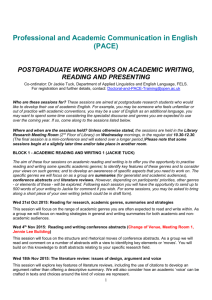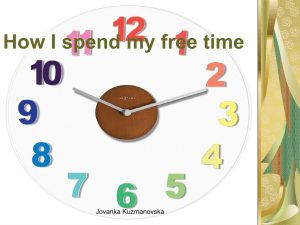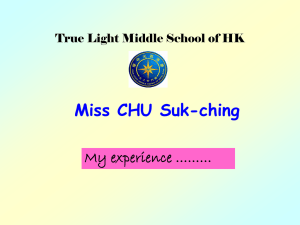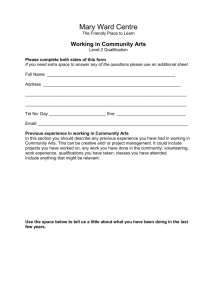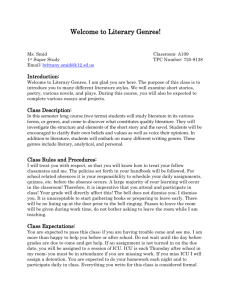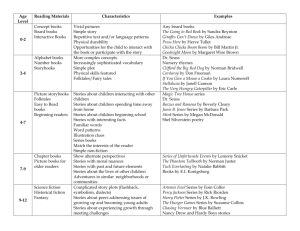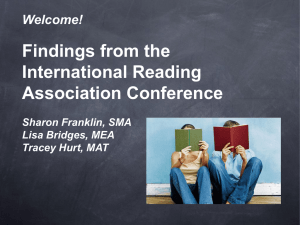Dates and topics: - The Open University
advertisement
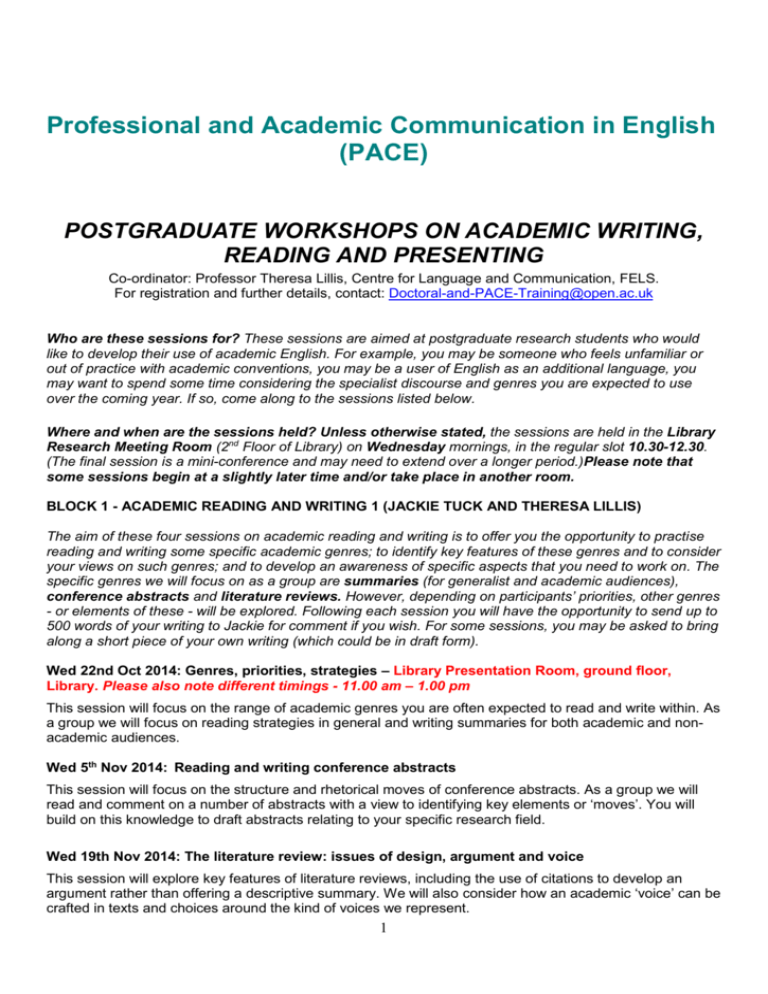
Professional and Academic Communication in English (PACE) POSTGRADUATE WORKSHOPS ON ACADEMIC WRITING, READING AND PRESENTING Co-ordinator: Professor Theresa Lillis, Centre for Language and Communication, FELS. For registration and further details, contact: Doctoral-and-PACE-Training@open.ac.uk Who are these sessions for? These sessions are aimed at postgraduate research students who would like to develop their use of academic English. For example, you may be someone who feels unfamiliar or out of practice with academic conventions, you may be a user of English as an additional language, you may want to spend some time considering the specialist discourse and genres you are expected to use over the coming year. If so, come along to the sessions listed below. Where and when are the sessions held? Unless otherwise stated, the sessions are held in the Library Research Meeting Room (2nd Floor of Library) on Wednesday mornings, in the regular slot 10.30-12.30. (The final session is a mini-conference and may need to extend over a longer period.)Please note that some sessions begin at a slightly later time and/or take place in another room. BLOCK 1 - ACADEMIC READING AND WRITING 1 (JACKIE TUCK AND THERESA LILLIS) The aim of these four sessions on academic reading and writing is to offer you the opportunity to practise reading and writing some specific academic genres; to identify key features of these genres and to consider your views on such genres; and to develop an awareness of specific aspects that you need to work on. The specific genres we will focus on as a group are summaries (for generalist and academic audiences), conference abstracts and literature reviews. However, depending on participants’ priorities, other genres - or elements of these - will be explored. Following each session you will have the opportunity to send up to 500 words of your writing to Jackie for comment if you wish. For some sessions, you may be asked to bring along a short piece of your own writing (which could be in draft form). Wed 22nd Oct 2014: Genres, priorities, strategies – Library Presentation Room, ground floor, Library. Please also note different timings - 11.00 am – 1.00 pm This session will focus on the range of academic genres you are often expected to read and write within. As a group we will focus on reading strategies in general and writing summaries for both academic and nonacademic audiences. Wed 5th Nov 2014: Reading and writing conference abstracts This session will focus on the structure and rhetorical moves of conference abstracts. As a group we will read and comment on a number of abstracts with a view to identifying key elements or ‘moves’. You will build on this knowledge to draft abstracts relating to your specific research field. Wed 19th Nov 2014: The literature review: issues of design, argument and voice This session will explore key features of literature reviews, including the use of citations to develop an argument rather than offering a descriptive summary. We will also consider how an academic ‘voice’ can be crafted in texts and choices around the kind of voices we represent. 1 Wed 3rd Dec 2014: Using your networks and other issues/genres – Central Meeting Room 11. Please note room change. (Other genres/issues to be agreed with participants depending on priorities identified) The content of this final session in the first block on academic reading and writing will be negotiated with participants. One key aspect which will be discussed is how participants can offer and receive support for writing through participation in networks. BLOCK 2 ACADEMIC READING AND WRITING 2 (JACKIE TUCK) This second block of four sessions will continue the exploration and practice of reading and writing academic genres begun in the first block. Sessions will include an exploration of the language of argumentation, critical reading strategies and improving the structuring of texts at a number of levels. All four sessions will draw on examples of writing from a range of academic disciplines, and will also encourage you to apply the ideas to your own writing. It is a good idea to bring along to each session some of your current writing (whether finished or still in draft form). Wed 14 January 2015: Identifying a writer’s viewpoint This session will help you to recognise when a writer is presenting their own opinion, rather than factual information. Through looking at the language used to signal how far a writer is committed to a particular viewpoint, the session aims to develop your ability to understand shades of meaning in a writer’s argument, and to express your own views effectively. Wed 21 January 2015: Dialogue with the reader This session considers writing as a form of dialogue with an imaginary reader. It will help you to create a good argument by anticipating what readers may be thinking and by using appropriate language to persuade them along your own lines of thought. This approach can also equip you to read more critically. Wed 28 January 2015: Information structure In this session, the focus is on how to organise your writing at all levels, from the construction of sentences and paragraphs to the organisation of whole chapters. Using the basic principle that we tend to move from what is familiar to what is new, you will discover some strategies to help in both reading and writing academic prose. Wed 4 February 2015: From notes to drafts In this session we will explore ways of building your writing from notes to draft stage using the outlining feature in Word. We will briefly look at the use of bibliographic tools such as Endnote to organise your notes from reading. (Note this session is not a training session in referencing tools.) Please come with any other techniques you’d like to share on how you organise, plan and draft your writing. BLOCK 3 ACADEMIC SPEAKING/ PRESENTATION SKILLS (JENNY MCMULLAN) The aim of these four sessions is to develop and practise your presentations in academic and settings. Participants will be encouraged to prepare academic presentations on their specific area of research, as well as on topics of more general interest, and to present these to fellow students attending the workshop. 2 Wednesday 11 February 2015: Where is speaking used within research and higher education? Please note: Time change 11.00am – 1.00pm & Venue change to Library Presentation Room, ground floor, Library This session will discuss the different ways speaking is used within higher education (HE) and draw on video stimulus to explore the effectiveness of different types of spoken texts. This session should be of interest to anyone who wishes to improve skills and confidence in spoken academic interaction in English. Wednesday 25 February 2015: Critiquing speaking texts and developing strategies for our own presentations This session will recapitulate on some of the topics covered in the first session of Block 3. The group will explore and critique different types of presentations within higher education - for example, lectures, online conferences and research group meetings. Participants will also be given time to reflect on specific forums they have participated in within their research studies and occasions they may be required to speak and present in the future. Strategies to prepare for these events will be discussed, and literature which may be of use when preparing for speaking events will be introduced. Time will also be given to organise and prepare individual presentations. Wednesday 4 March 2015: Academic interaction This session will cover specific areas of spoken academic interaction, such as contributing to seminar discussions, supporting or challenging other people's ideas, and dealing with challenges to one's own work. This session, like all the others, is open to all, but should be of particular interest to students for whom English is not a first language. Time will also be given to prepare and rehearse individual presentations for the mini-conference on the 11th of March. Wednesday 11 March 2015: Mini-conference This will be an opportunity to rehearse a conference presentation in front of an audience who will be prepared to give you constructive feedback. The session is open to all (and in the past it has proved very useful to have a good participating audience!) but it will be important for all would-be presenters to indicate in advance that they are intending to present, so that appropriate arrangements can be made. 3 The PACE TEAM Theresa Lillis is Professor in English language and Applied Linguistics at The Open University, UK. She has taught English as a second language at primary, secondary, adult and higher education levels as well as courses in academic writing and writing for publication, language studies, language and learning, applied linguistics, sociolinguistics and English as a second language/bilingualism. Her principal research areas are the academic writing and literacy practices of students (primarily for assessment) and scholars (primarily for publication), as well as writing across academic and non-academic domains, particularly in the area of social work. Recent publications include Academic Writing in a Global Context (Routledge 2010, with Mary Jane Curry), The Sociolinguistics of Writing (Ediinburgh University Press 2013). Jenny McMullan began her career as a Drama and English teacher in secondary schools in Australia and Singapore. Since then she has been a tutor in English language studies, English for Academic Purposes (EAP) and English as an Additional Language in the UK, Vietnam and China. In Shanghai, she was an Associate Dean for academic literacies within an Australian-Chinese academic joint venture. In the UK, she was a pre-sessional EAP tutor at Reading and Southampton universities and an academic literacies tutor for a language learning centre within the University of Essex. Jenny is currently pursuing a full-time PhD at the Open University which is a project exploring the academic writing practices of research students. Jenny is also interested in reflecting on the significance of gender for students writing within academic contexts. Jackie Tuck studied for an English degree before training as a teacher. She has taught English (Language and Literature), Communications, English as an Additional Language and English for Academic and Specific Purposes in schools, communities, colleges and universities in the UK, and also taught English in Spain. She is currently a Lecturer in English Language Studies and Applied Linguistics in the Centre for Language and Communication in the Faculty of Education at the OU. Jackie takes a particular interest in academic literacies and has recently completed a PhD with the Open University which explores the practices of academic teachers in the disciplines around students’ writing in UK Higher Education. *********************************** PACE involves a number of activities aimed at developing people’s expertise and confidence in a range of academic writing, publishing and presentation practices. The activities are based on current research on academic communication practices. The PACE Coordinator is Professor Theresa Lillis and other PACE team members are Jenny McMullan and Jackie Tuck. For specific queries about PACE, contact Jackie Tuck jackie.tuck@open.ac.uk . 4
